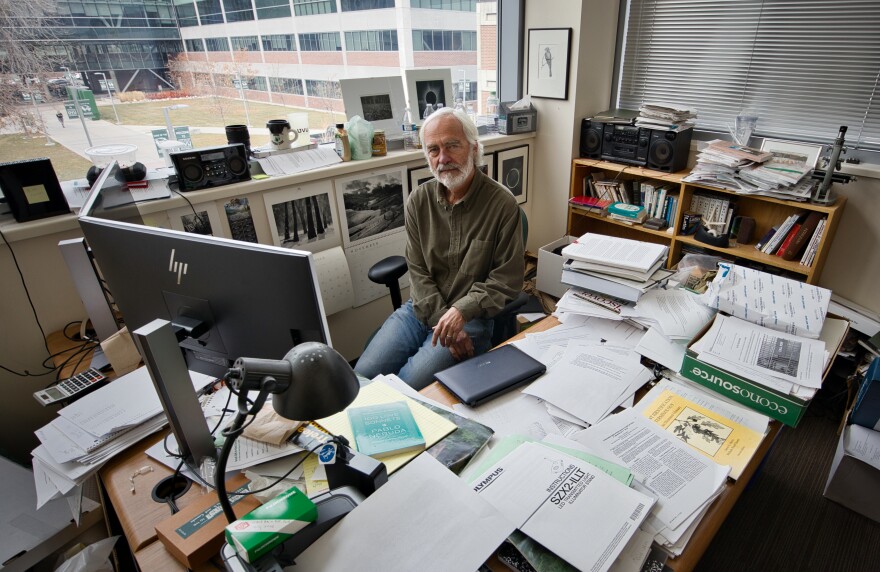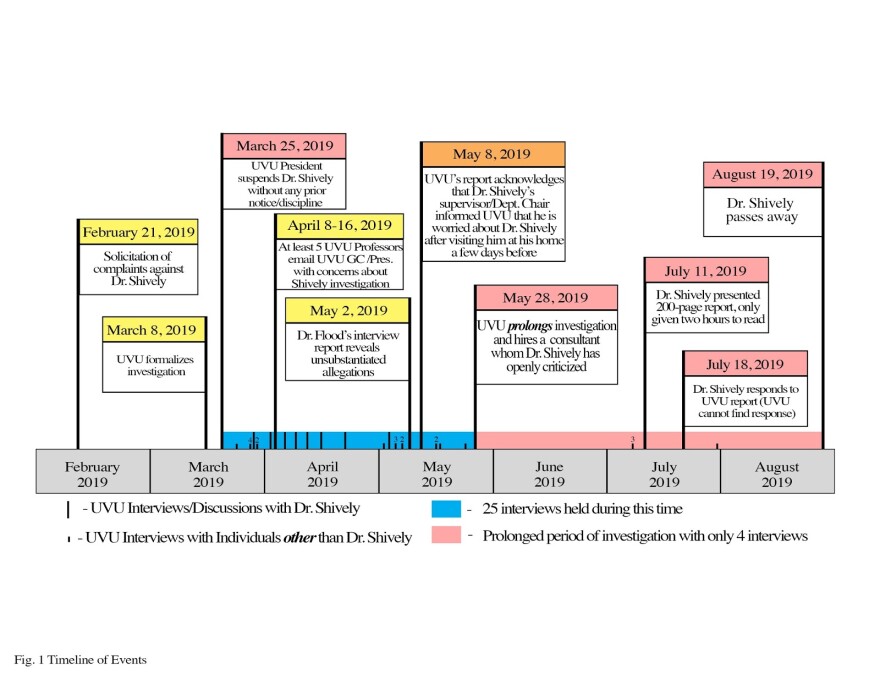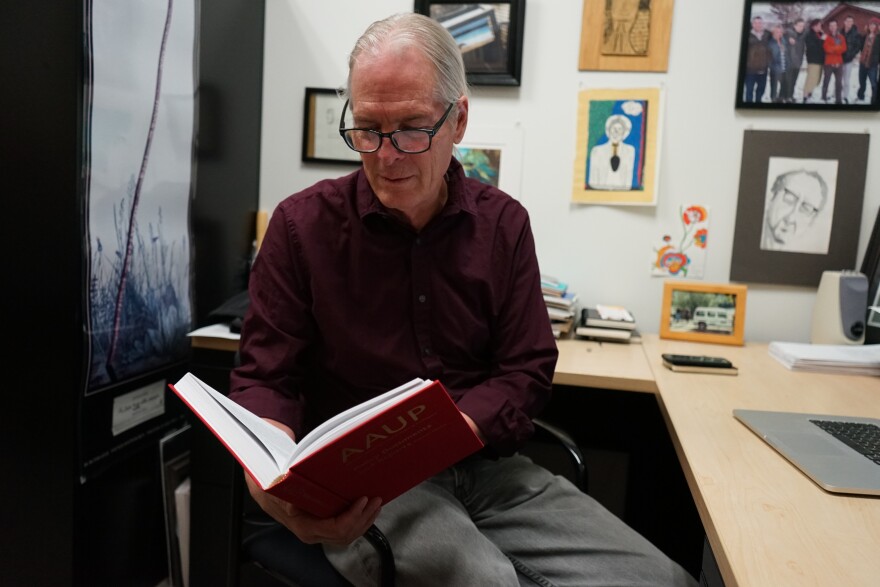Utah Valley University field botany Professor Jim Harris remembers the last time he saw his long time colleague Mike Shively.
It was on Friday, Mar. 15 before they went on spring break. Their offices were next door to one another, and the two men chatted briefly about Shively’s upcoming canoe race and trip to Texas.
When Harris came back to work on Monday, Mar. 25, Shively was gone. Harris didn’t think anything of it until he started hearing whispers that something had happened.
“I tried to call him at one point at home because this was all shrouded in great secrecy. None of us knew exactly what was going on,” Harris said.
But no one answered.
Harris would later learn that Shively had been placed under investigation by the university and was prohibited from discussing it with anyone.
“I didn’t attempt to call him again,” Harris said. “Now, I’m wishing I had.”
Shively died by suicide in August, about five months after the investigation started. He was 73 years old.
Mental health experts say suicide is complex and there are almost always multiple causes. But Shively’s family and colleagues believe the stress from the investigation against him may have contributed to his death.
Shively’s family and its lawyers declined to give KUER an interview for this story. UVU also declined requests for an interview.

Harris and 15 other current and former UVU faculty members see Shively’s death as an extreme example of problematic investigation tactics at the institution. In a public letter addressed to university president Astrid Tuminez last month, the group outlines their concerns with the way Shively’s and other investigations were conducted.
“In many cases, investigations have proceeded in the absence of prima facie evidence of misconduct and the allegations employees have been forced to respond to have been completely unsubstantiated,” the faculty group said in the letter. “Dr. Michael Shively’s recent suicide is an example of just how traumatizing being the target of a UVU investigation can be.”
In a December statement sent to KUER, UVU said that its main policy on disciplinary actions and terminations, Policy 648, follows the Utah System of Higher Education’s policy on academic freedom, professional responsibility, tenure, termination, and post-tenure review.
“UVU Policy 648, which was created with faculty direction and implemented in 2010, complies with applicable Utah State Board of Regents policy and applicable law, and is similar to other Utah System of Higher Education faculty discipline policies. UVU is not an outlier.”

'People Should Be Treated Fairly'
Shively taught anatomy and physiology at UVU for 27 years. He was a past president of the UVU Faculty Senate, the former chair of the Department of Life Sciences and had served as the faculty athletic representative.
He was also known for having rigorous courses.
“A lot of students, and I tend to agree with them, thought of his anatomy class as being the toughest class on campus. It was truly rigorous and that does open him up to a lot of complaints by students,” Harris said.
President Tuminez sent a letter dated Mar. 25 to Shively. It listed six complaints, which administrators said were “in violation of UVU’s Code of Conduct and multiple UVU policies.”
- Requiring course books and receiving royalties
- Intimidation and threat toward students and employees, causing significant mental distress to some
- Arbitrary and capricious course requirements and grading
- Violations to the academic freedom of colleagues
- Failure to follow disability accommodation policies and failure to cooperate in a timely manner with Accessibility Services
- Discrimination and harassment on the basis of protected class
The letter, which was shared with KUER, said Shively was suspended with pay effective immediately. He was prohibited from communicating with UVU students and from talking with colleagues in an official capacity.
Alex Simon is a behavioral science professor and the current president of the UVU chapter of the American Federation of Teachers — a labor union.
Shively admitted that he was receiving royalties from his textbook, but told Simon he wasn’t aware that it was against school policy until he read the suspension letter. But Simon said Shively seemed bewildered about where the other charges might have come from.
“What he was worried about was, what are people going to think I did,” Simon said.

UVU said it had completed Shively’s investigation and was discussing next steps with his legal counsel when it learned of his death. The university also said the investigation found most of the allegations against Shively to be substantiated, but did not say which of the six those were.
Simon penned the public group letter to Tuminez, and said Shively was not the only faculty member to be the subject of a “traumatizing” investigation. Besides Shively’s case, he wrote about a professor who took stress leave after a months-long investigation which cleared him of allegations. He also referred to a tenured professor who was so “demoralized” and “disillusioned” with UVU after an investigation that he resigned.
“I don’t think it’s an exaggeration to say what they’ve been doing here is conducting secret tribunals,” Simon told KUER. “One of the biggest problems is that they’re conducted in the dark. The accused doesn’t know what they are accused of [and] they don’t have representation.”
In an email to faculty members who were seeking clarification on the university’s policy, UVU’s general counsel Karen Clemes said that under Policy 648, due process provisions are only given in cases where formal discipline is recommended.
Shively had been suspended with pay. Clemes did not comment on the case itself, but said that kind of suspension is not a formal disciplinary action.
A distinction between suspension with or without pay, however, is not addressed in the due process section of the policy.
Simon thinks those rights should be afforded to all faculty members at every step of an investigation.
“People should be treated fairly and they should also be treated with respect. Unfortunately, Professor Shively received none of these,” Simon said.
Moving Forward

UVU has been working on revising Policy 648 since it was implemented as an interim document in 2010. Those efforts were stalled until UVU's faculty senate took the matter on in recent meetings. The senate has formed a task force that will look into whether the entire policy needs to be “rebooted.”
Scott Abbott teaches philosophy, integrated studies and humanities at UVU. He also serves as the vice president of its chapter of the American Association of University Professors and he’s a member of the senate’s task force. Having better policy is not only good for faculty members, it’s also good for the administration, Abbott said.
“Unless we all have a sense that we have good policies and that we are doing our very best to follow those policies — then we are distrustful of each other.”
In a December statement to KUER, UVU administrators say they look forward to working with faculty members on discussions about Policy 648.
Simon said he’s encouraged by this effort. He’s hopeful that the Shively family will get some peace by seeing the work that he and others are doing to make changes at Utah Valley University.
If you or someone you know needs help, contact the National Suicide Prevention Lifeline at 1-800-273-8255, the Utah Crisis Line at 801-587-3000 or the Crisis Text Line by texting 741741.

